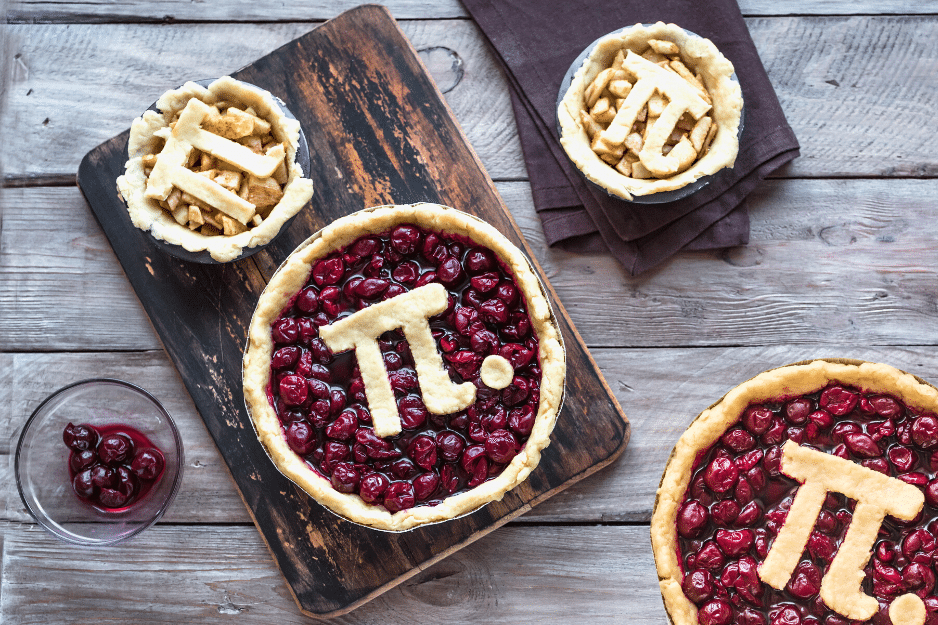*Editor’s Note: The “Views from NAU” blog series highlights the thoughts of different people affiliated with NAU, including faculty members sharing opinions or research in their areas of expertise. The views expressed reflect the authors’ own personal perspectives.
Jeff Rushall, teaching professor at the Department of Mathematics and Statistics at NAU where he has been teaching for 20 years, has enlightened many students in the field of mathematics during his tenure. He has recently published papers on topics such as primitive Pythagorean quadruples and Greek ladders for approximating algebraic numbers. In honor of the upcoming Pi day (can you guess the date?), Rushall discusses π and its often-overrated role in STEM fields. He provides insights into the computational extremes of knowing π and the unusual ways in which it might change one’s life. Rushall also offers advice on how to approach the study of π, enjoy the unpredictable moments when it alters one’s life and the pie flavor with which he chooses to honor the day.
By Jeff Rushall
Teaching professor, Department of Mathematics and Statistics
The number π is ubiquitous in science and popular culture. As a mathematician, this troubles me, because the role that π plays in STEM fields is, in my opinion, somewhat overrated. It is true that π is one of the few quasi-useful numbers recognized by anyone who suffered through high school geometry or trigonometry classes. Still, academic suffering is no excuse to worship a number like π. For those who do not know, π is defined to be the ratio of the circumference to the diameter of any circle, namely
π≅3.141592653589793238462643383279
That approximation symbol is up there because the decimal expansion for π goes on and on and on, forever and ever, with no discernable pattern—i.e., we don’t know the exact value of π. Undaunted, a cult of nerds, called piphilologists, are obsessed with memorizing the known digits of π. I do not understand why piphilologists do what they do, but I am keen on helping you understand what π is, why π is important and the unusual ways in which π might change your life, especially given that Pi Day (March 14) is approaching. To this end, let’s first talk computational extremes…
At the imprecise end of “knowing” π, we can say that π is a little bit bigger than 3. For many that is fine. In fact, in 1897, the fine state of Indiana tried to pass a bill that, among other things, would have legislated the value of to be a very inexact π =3.2. Thankfully, a mathematician from Purdue University convinced the Indiana state senate to kill that bill. By comparison, rocket scientists at NASA and SpaceX need to know π to about 15 decimal places for their rocket science stuff to work. And any physicist you run into on campus will happily inform you that the smallest observable unit of length in the universe, the Planck length, can be computed knowing π to about 65 decimal places. So one could argue that knowing π to about 65 decimal places is good enough (I suspect that physicists and piphilologist don’t party together much).
The more precise end of “knowing” π is epitomized in a 558-page book sold by Amazon called “Pi to Five Million Places,” which contains the first 5,000,000 digits of π. The book is a mere drop in the π-digit bucket, as we actually “know” the value of π to be about 100,000,000,000,000 (that’s 100 trillion) decimal places. If someone convinced Amazon to print the remaining 99,999,995,000,000 known digits of π, the resulting twenty-million-volume set would be forty times the number of books currently held at Cline Library: tempting to purchase, but difficult to keep.
Since our target range of “knowing” π is somewhere between “3” and “100,000,000,000,000 decimal places,” an appropriate and sufficient understanding is somewhere in between. But aside from the aforementioned importance of π to rocket scientists and trig teachers, why do normal people need π? Well, there are intangibles associated with π that can influence people in subtle ways. Let me share (using the vernacular of late 19th century Hoosiers) π interesting and unique ways that π has positively impacted my life that you won’t find in any Reddit thread.
- π makes me laugh: I once gave an exam in MAT 238 (vector calculus) in which the answer to every problem was π. I thought doing this was pretty funny. Only six of my 41 students worked all the problems correctly, and only two of those six noticed that all test questions had the same answer, π, which I also thought was pretty funny.
- π gave me memories in France: my college buddy Joel Schnoor is a piphilologist: he insisted on writing π to 250 digits on a chalkboard each week. He got married about π years after graduation; I met him and his wife on their honeymoon in France. No piphilologizing took place, but we did eat at a Burger King in Versailles and wore Burger King crowns.
- π led me to marriage: the cult movie classic “Pi” played at the Flagstaff Film Festival in 1999. I went to see it with a cute girl (and fellow math nerd) named Amy. I wasn’t crazy about the movie, but I was hugely smitten with my date, and soon thereafter, we got married. We have approximately π kids, none of whom are piphilologists.
I can’t promise you that π will influence your life in the same remarkable ways that it has influenced my life, but gosh, you never know. Here’s my advice: Know a few digits of π, avoid piphilologists and relish the unpredictable moments when π will alter your life. And if you choose to eat a slice of pie on π day, I recommend blueberry.



